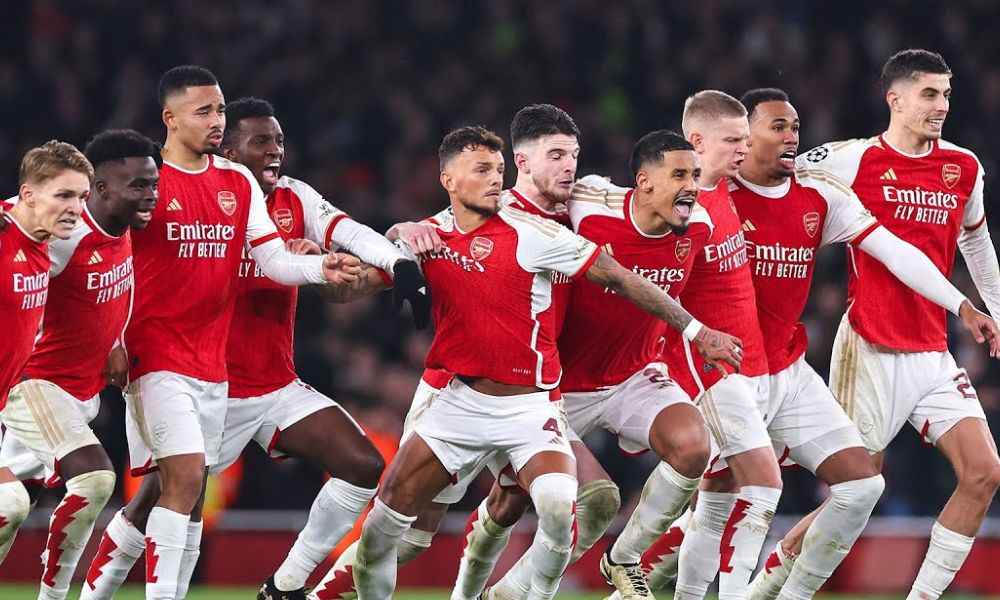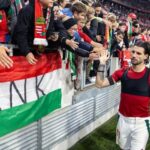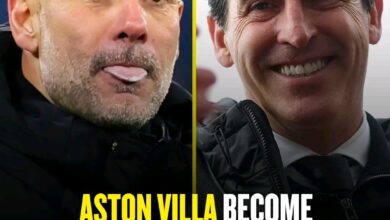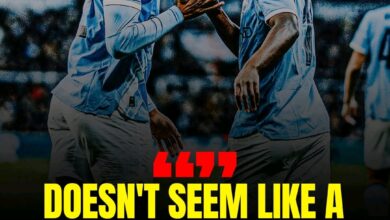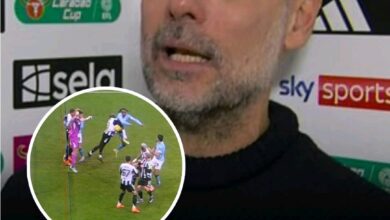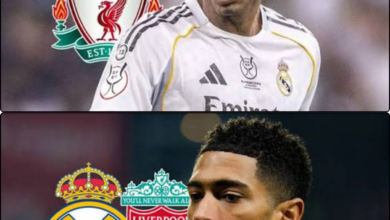Ronaldo’s Record-Breaking Double Not Enough Against Hungary in World Cup Qualifier

The night in Lisbon began like a normal World Cup qualifier — floodlights shining bright, fans singing, and the Portuguese flags waving high. But what happened inside the Estádio da Luz that evening became something unforgettable, something that reminded the football world that heart can sometimes equal greatness. It was the night Hungary stood up against Cristiano Ronaldo and refused to bow.
From the first whistle, it was clear Hungary were not there just to defend. They had come to fight, to dream, and to prove that even against one of the greatest players in history, belief can move mountains. Marco Rossi’s men looked fearless, pressing high and playing with purpose. The Portuguese fans, confident of an easy win, clapped as if waiting for Ronaldo’s magic to start. But instead, something else happened.
In the 8th minute, Hungary struck first. From a beautifully taken corner, defender Attila Szalai rose above everyone. Time seemed to slow as the ball met his forehead, slicing through the air and landing in the back of the net. Silence spread across the stadium. Szalai ran to the corner flag, arms wide open, shouting in disbelief. For the first time in almost seventy years, a Hungarian had scored on Portuguese soil. For a moment, the giants were shaken. The underdogs were alive.
Portugal reacted quickly. They poured forward, and soon, the red shirts surrounded Hungary’s box. But Hungary’s defense stood firm, sliding, blocking, and clearing. Captain Dominik Szoboszlai shouted instructions, waving his arms like a leader born for such nights. Every tackle, every clearance, every touch mattered. They weren’t just defending a goal; they were defending pride, history, and belief.
Then came Cristiano Ronaldo. The legend, the man of records, the symbol of Portuguese football. He had looked frustrated early on, but once he found space, everyone knew what was coming. In the 22nd minute, João Félix sent a cross that seemed harmless, but Ronaldo’s movement was poetry. He appeared from nowhere, leapt into the air, and with a powerful header, the ball flew past the Hungarian goalkeeper. The stadium erupted. Ronaldo smiled, that familiar, confident smile. He had equalized. The GOAT had spoken.
But Ronaldo wasn’t done. Just before halftime, as the fourth official signaled three minutes of added time, Portugal pressed again. Bruno Fernandes found Ronaldo near the edge of the box. One touch, one turn, one strike — the ball curved perfectly into the bottom corner. Goal number two. The fans roared again. Ronaldo dropped to his knees and pointed to the sky. It was his 41st goal in World Cup qualifiers, breaking yet another world record. At 40 years old, he had just made history again.
The halftime whistle blew, and Hungary walked off the pitch knowing they were behind, but not beaten. In the dressing room, Marco Rossi’s words were simple but powerful. “We came here not to be afraid,” he said. “We came here to make them remember us. Keep fighting. The game is not over until the last second.” Szoboszlai looked at his teammates and nodded. “If we fight together, we can still take something from this,” he said quietly.
The second half began with renewed intensity. Portugal, full of stars, tried to control the game, but Hungary refused to vanish. Every time Ronaldo touched the ball, two defenders followed. Every time Portugal attacked, Hungary countered with bravery. Dominik Szoboszlai, Hungary’s captain and Liverpool midfielder, started to influence the game more. His quick feet, long runs, and confidence brought life to the team again.
Around the 60th minute, Hungary almost equalized when Roland Sallai’s shot hit the post. The sound of the ball striking metal echoed across the stadium like a warning. Portugal then hit the woodwork twice themselves, one from Ronaldo and another from Bernardo Silva. It was a game of inches, a game of emotions, and every second felt heavier than the last.
As minutes passed, the tension grew. The Portuguese fans started to sing louder, trying to push their heroes forward. The Hungarian fans, few in number but loud in spirit, waved their flags and sang old songs of pride. The world was watching, but Hungary was writing their own story.
In the 85th minute, Marco Rossi made a final change. He brought on fresh legs, players who had barely played in qualifiers before. The coach’s message was clear — run, press, and never give up. Szoboszlai, exhausted, still kept shouting instructions. “One more chance,” he kept saying. “We only need one more chance.”
Then came stoppage time. Portugal looked comfortable, passing the ball around, expecting the final whistle. But football, as always, loves drama. In the 91st minute, Hungary won a free kick near the edge of the box. It was their last chance, their last breath. Szoboszlai placed the ball down, breathing heavily. His teammates gathered in the box. The referee’s whistle blew. The stadium held its breath.
Szoboszlai took three steps back, looked up at the goal, and swung his right foot. The ball sailed over the wall, dipped suddenly, and curled toward the far post. The Portuguese keeper stretched, but it was too far. The net rippled. Goal. Szoboszlai had done it. 2-2. The Hungarian bench exploded. Players ran onto the field. The captain fell to his knees, hands over his face. It was unbelievable. Against all odds, Hungary had equalized in the dying seconds.
As the referee blew the final whistle, the Hungarian players collapsed on the grass — some in tears, others laughing in disbelief. They had stopped Portugal, they had stopped Ronaldo, and they had broken a curse that lasted almost 70 years. It wasn’t just a draw; it was a statement to the world. Hungary was back.
After the match, Szoboszlai was interviewed by M4 Sport. His voice was soft, tired but full of emotion. “I was so tired that I couldn’t even go near post anymore,” he said. “I just hoped the ball would go far, and it did. When you fight for something with your heart, sometimes luck stays on your side.” He smiled, that young and confident smile of a captain who knows what leadership means.
Coach Marco Rossi also couldn’t hide his pride. “This point might not change the table too much,” he said, “but it changes everything inside us. It gives us confidence, belief, and unity. Against a team like Portugal, you need heart, and tonight, my players showed it.” He praised the start, the finish, and the bravery of every man who wore the Hungarian jersey that night. “We hit the post once, they hit it twice — but in football, it’s not always about numbers. It’s about spirit.”
Ronaldo, despite his brace and new world record, looked disappointed as he walked off the field. For him, it was another personal milestone, but not the result Portugal needed. Hungary had denied him a win on a night meant to celebrate his greatness. And in football, even legends sometimes have to bow to destiny.
The draw meant Hungary climbed to second in Group F, above Ireland and still within touching distance of qualification. Their dream of reaching the World Cup was alive, their confidence restored. The final games in November — against Armenia away and Ireland at home — would decide everything. But one thing was already certain: Hungary had rediscovered its football soul.
For many Hungarians, this game felt like a movie, like a night when time stopped and pride returned. Old fans remembered the days of Puskás and the Mighty Magyars, when Hungary was feared across Europe. Younger fans saw new heroes — Szoboszlai, Szalai, and the fearless men who stood up to Ronaldo. It was more than football; it was a reminder that even small nations can dream big.
Back home in Budapest, fans gathered in bars, parks, and living rooms, cheering into the night. Cars honked, flags waved, and people sang the national anthem in tears. For one night, the whole country smiled. The newspapers called it “The Miracle of Lisbon,” and even foreign media admitted — Hungary had earned every bit of respect.
Football is about moments that make your heart race. It’s about that unexpected twist, that unstoppable dream, that one goal that changes everything. And on that night, Dominik Szoboszlai became the symbol of that dream. His free kick wasn’t just a goal; it was a message to every young player watching — that courage and belief can take you anywhere.
As Marco Rossi said later, “Sometimes football doesn’t give you what you deserve, but tonight it did.” He looked emotional as he spoke to reporters. “This team has something special. We have new weapons — young players who are not afraid. We will go to Armenia, we will fight again, and we will dream again.”
As the Hungarian players boarded their plane home, they were welcomed by applause from airport staff and fans. Szoboszlai carried the match ball, smiling quietly. The night had been long, the journey even longer, but the spirit was stronger than ever.
For Portugal, it was a warning that no team can be underestimated. For Hungary, it was a beginning — the rebirth of a team, a nation, and a dream that had slept too long. Football is not always about trophies; sometimes, it’s about pride. And Hungary, that night in Lisbon, had found theirs again.
